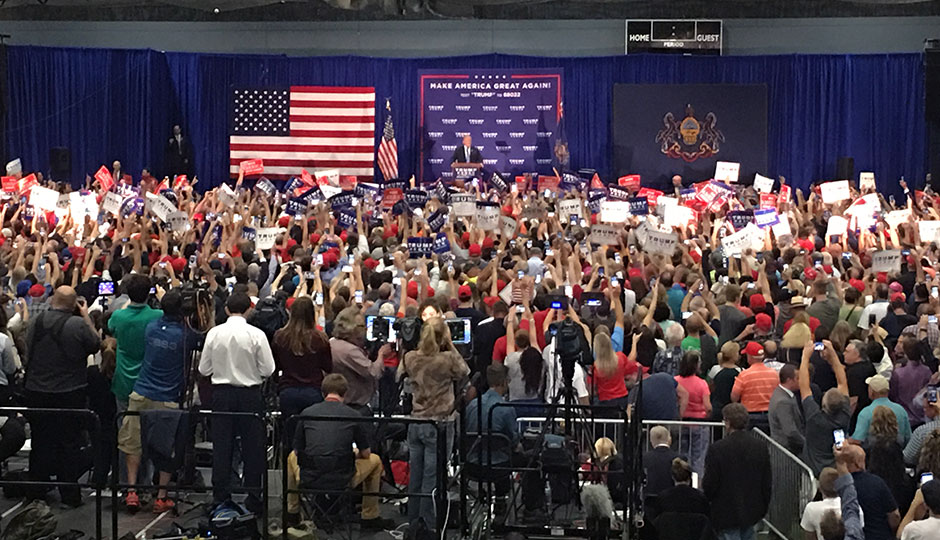After Trump’s Win, White Liberals Are Now a Minority

Donald Trump speaks at the Newtown Athletic Club in Bucks County on October 21st | Photo: Dan McQuade
Around 2:40 a.m. on election night, I left the watch party I’d been attending and took an Uber home. It was shortly after the Associated Press announced that then-Republican presidential candidate Donald Trump had won Pennsylvania. I was over it — it actually began to sink in that he was actually going to win.
During the ride, my driver — a young white guy with teary eyes — turned up KYW Radio in the car as broadcasters finally confirmed that Trump had won the election. I was slowly moved to tears myself. The horrific bigotry that spewed from his lips, his lack of political experience, and endorsement from the Ku Klux Klan hadn’t been enough to stop him from defeating one of the most qualified candidates of my lifetime.
But as my driver turned on Walnut Street and upped the volume on the radio, I began to realize his tears weren’t the same as mine. As we heard the Trump supporters on air chanting “USA, USA, USA,” I saw that he had a calming sense of relief. He was crying tears of joy, whispering to himself: “It’s about damn time.”
He was among the silent majority who made their choice loud and clear that night. A young, white, most likely straight American who felt it was time for a change after eight years of President Barack Obama. He’s the type of voter I felt like I couldn’t relate to. He’s the kind of person my white progressive friends ignored.
But on election night, he felt validated. Something about Trump’s call for a new direction — no matter how many argued it was misguided — spoke to him. I stepped out of the car paralyzed by the new reality of knowing that white liberals who had positioned themselves as knights in shining armor were now the new minority. That America is no longer a forward-looking, progressive society bending itself to the will of diversity and inclusion.
In one night, the illusion shattered.
But in many ways, I don’t feel that damn defeated. I’m just disappointed. Similar symptoms of anger have always been a part of the world as I’ve lived it as a young black gay man. In many ways, this type of letdown by white people feels natural.
Despite some notable breakthroughs during Obama’s presidency, I still must confront the ills of mass incarceration, high black poverty and unemployment, gun violence, extrajudicial police killings, nationwide LGBTQ discrimination, and other forms of systemic trauma that affect people who look like me. Only this time, I, along with many white peers who consider themselves “allies,” no longer have to debate about how exactly detrimental our current political system is.
Right now, if you’re a white person who has been progressive throughout this entire election cycle, that gut-wrenching feeling of betrayal you’re wracked with is almost similar to what I experience on a regular basis. How does it feel to lose privilege? To feel vulnerable and helpless? To live in a nation you thought supported you but actually didn’t? Truth is, people of color and other marginalized groups have always been trying to keep our heads up above troubled waters. Welcome to the club.
While there will be countless political talking heads with several explanations for Hillary Clinton’s loss, just know that part of the problem might lie within white liberals who didn’t check in with their disgruntled family members. This outcome isn’t the fault of people of color — black women in particular were nearly unanimous in their support of Clinton against Trump — but those white men and women who took a shot on Trump.
Trump supporters don’t live on an isolated mythological island, but in the hometowns and back yards of many of my white friends who now consider themselves yuppies. Polling data is now suggesting that young white men who didn’t attend college were a major bloc supporting Trump in this election. In other words, those who many white liberals left behind on their way to the top from middle America had a stake in this election.
So now what? That’s the biggest question.
For starters, progressive politics has to be intersectional — no more ifs, ands, and buts about it. It’s time to start including poor white people who feel like they’re at their wit’s end, because financial inequality across all racial lines was a major issue that never seemed to gain much steam during Clinton’s campaign. Social issues themselves must also be inclusive of those who are not only passionate about them, but affected by them as well.
That’s part of the reason why we saw third-party votes tip the scale in key states such as Arizona, Florida, Maine, Michigan, Pennsylvania, and Wisconsin — because individuals who felt included during Obama’s campaign felt left out of the bigger picture this go-around. When you look at the issues pertaining to a lack of diversity in top leadership positions in the Clinton campaign, you can’t help but wonder the underestimation of how much those “protest votes” would cost them.
And despite the obvious case of sexism that played a role in defeating the possibility of America’s first woman president, it’s become clear that our political way of operating will no longer be the same. It’s time that progressive allies think differently about how to move the country forward if we are to sustain a sense of dignity for the next four years.


